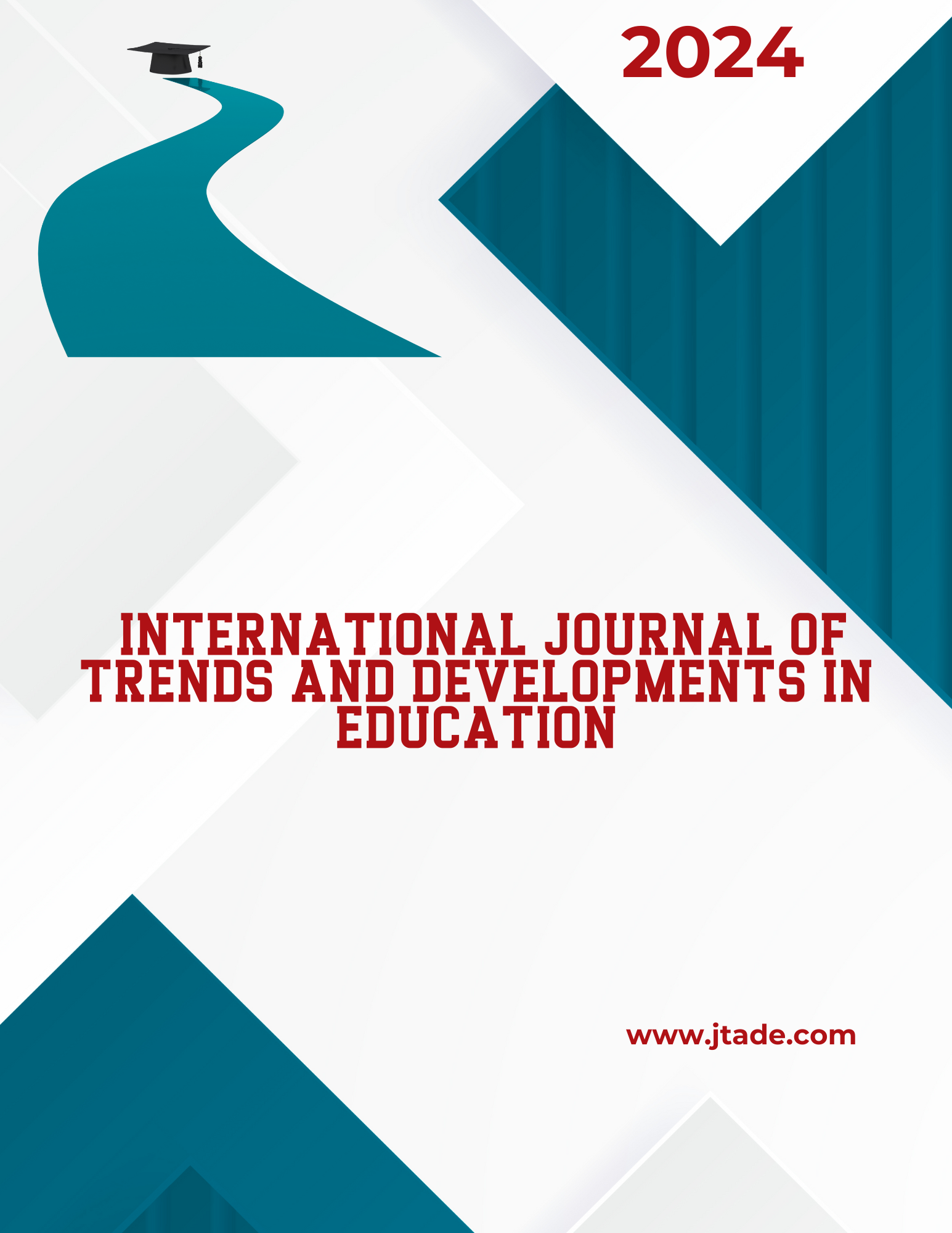Research article | Open Access
International Journal of Trends and Developments in Education 2022, Vol. 2(2) 34-54
A Phenomenology Study: Headteacher
pp. 34 - 54
Publish Date: December 24, 2022 | Single/Total View: 68/122 | Single/Total Download: 71/127
Abstract
This research, which is designed on the phenomenon of a headteacher, which is frequently on the agenda of our country in recent years and which attracts attention in terms of career planning in teaching, examines how the concept of 'Head-teacher' is perceived by different participants, the opinions and information of the participants on this subject, how they evaluate the process of determining the title in line with the criteria , and their expectations from the title. aims to explain the reasons. The research has a phenomenological design and maximum diversity sampling, which is one of the purposeful sampling methods, was preferred in the determination of the participants. Thus, interviews were conducted with administrators and teachers working in schools at different socio -economic levels, union presidents and branch managers who are currently working through a semistructured interview form. The data obtained from the interviews were analyzed by content analysis and the codes obtained as a result of the analysis were interpreted by associating them with appropriate themes. As a result of the analysis, a total of 152 codes were reached. The codes obtained were gathered under six different themes and they were conveyed with the quotations obtained from the participants' opinions . As a result, it was concluded that the participants defined the headteacher phenomenon differently from the career steps defined in the Occupational Law, they had expectations and concerns about the process, and the criteria determined within the scope of the law during the evaluation process were insufficient. Therefore, we foresee that holding information meetings in order to reduce the concerns about the process, redesigning the criteria and evaluation process in a more objective and merit -based way, and organizing the career ladder at a level that meets the expectations of teachers will increase the quality of education and also make teachers give more importance to their personal development.
Keywords: Head-Teacher, Education, Career ladder, Professional law, Teacher, Regulation
APA 7th edition
Akici, B.G., & Canik, T. (2022). A Phenomenology Study: Headteacher. International Journal of Trends and Developments in Education, 2(2), 34-54.
Harvard
Akici, B. and Canik, T. (2022). A Phenomenology Study: Headteacher. International Journal of Trends and Developments in Education, 2(2), pp. 34-54.
Chicago 16th edition
Akici, Burcu Gurgen and Tezcan Canik (2022). "A Phenomenology Study: Headteacher". International Journal of Trends and Developments in Education 2 (2):34-54.
Akyüz, Y. (1992). Atatürk'ün eğitim düşüncesinin kökenleri. Atatürk Araştırma Merkezi Dergisi, 8(23), 233-240.
Aydın, P.D. (2002). Alternatif okullar. Pegem Yayıncılık, Ankara.
Aydoğdu, A. (2020). Felsefe ve eğitim.
Bakioğlu, A. & İnandı, A. G. Y. (2001). Öğretmenin kariyer gelişiminde müdürün görevleri. Kuram ve Uygulamada Eğitim Yönetimi, 28(28), 513-529.
Bakioğlu, A., & Banoğlu, K. (2013). Öğretmenlikte kariyer basamakları uygulamasına ilişkin öğretmen görüşlerinin metaforlar ve sosyal ağ analizi yoluyla incelenmesi. Marmara Üniversitesi Atatürk Eğitim Fakültesi Dergisi, 37, 28-55.
Bilen, M. (1996). Plandan uygulamaya öğretim. Aydan Matbaası, Ankara.
Büyükkaragöz, S.(1990). Demokrasi. Türk Demokrasi Vakfı Yayınları, Ankara.
Çelikkaya, H. (1991). Eğitimin anlamları ve farklı açılardan görünüşü. Marmara Üniversitesi Atatürk Eğitim Fakültesi Eğitim Bilimleri Dergisi, 3(3), 73-85.
Çelikten, M. (2008). Öğretmenlik mesleğinde yeni model arayışları. Selçuk Üniversitesi Sosyal Bilimler Enstitüsü Dergisi , (19), 189-195.
Creswell, J. W. & Poth, C. N. (2016). Qualitative inquiry and research design: Choosing among five approaches. Sage publications.
Dağlı, A. (2006). İlköğretim öğretmenlerinin öğretmenlik kariyer basamaklarında yükselme sistemine ilişkin görüşleri. XV. Eğitim Bilimleri Kongresi Bildiri Özetleri, 13-15 Eylül 2006, Muğla.
Fedai, H.(2013). Bir başöğretmen: Mustafa turgut sarıca. Motif Akademi Halkbilimi Dergisi, 6(11), 5-14.
Fidan, T. & Öztürk, İ. (2015). Perspectives and expectations of union member and non- union member teachers on teacher unions. Eğitim Bilimleri Araştırmaları Dergisi - Journal of Educational Sciences Research, 5 (2), 191-220.
Göksoy, S., Sağır, M., & Yenipınar, Ş. (2014). Öğretmenlik uygulamasının değerlendirilmesi. Elektronik Sosyal Bilimler Dergisi, (49), 443-456.
Gündoğdu, K., & Kızıltaş, E. (2008). Kariyer basamaklarında yükselme sistemi ve sınavına ilişkin uzman öğretmen görüşleri. Kuram ve Uygulamada Eğitim Yönetimi, 55(55), 363-388.
Güven, İ. (2004). Osmanlı eğitiminin batılılaşma evreleri. Naturel Yayıncılık, Ankara.
Işık, Y.(2020). Mustafa kemal atatürk’ün eğitimci kişiliği ve “başöğretmen” unvanı. Avrasya Sosyal ve Ekonomi Araştırmaları Dergisi, 7(1), 173-196.
Kincheloe, J. L.(2018). Eleştirel pedagoji, Yeni İnsan Yayınevi. İstanbul. çvr: Kemal İnan.
Kocabıyık, O. O.(2016). Olgubilim ve gömülü kuram: Bazı özellikler açısından karşılaştırma. Trakya Üniversitesi Eğitim Fakültesi Dergisi, 6(1), 55-66.
Kocakaya, M. (2006). Öğretmenlik kariyer basamaklarında yükselme sisteminin öğretmenler tarafından algılanması. (Yayınlanmamış Yüksek Lisans Tezi. Kocaeli Üniversitesi, Sosyal Bilimler Enstitüsü, Kocaeli).
Miles, M, B., & Huberman, A. M. (1994). Qualitative data analysis: An expanded Sourcebook. (2nd ed). Thousand Oaks, CA: Sage.
Patton, M.Q. (2002). Qualitative research and evaluation methods (3rd Ed.). London: Sage Publications, Inc.
Resmi Gazete (2005). Öğretmenlik Kariyer Basamaklarında Yükselme Yönetmeliği. https://www.resmigazete.gov.tr/eskiler/2005/08/20050813-2.htm
Resmi Gazete (2022). Aday öğretmenlik ve öğretmenlik kariyer basamakları yönetmeliği. https://www.resmigazete.gov.tr/eskiler/2022/05/20220512-3.htm
Resmi Gazete (2022). Öğretmenlik meslek kanunu. https://www.resmigazete.gov.tr/eskiler/2022/02/20220214.pdf
Tavşancıl, E. & Aslan, A. E. (2001). Sözel, yazılı ve diğer materyaller için içerik analizi ve uygulama örnekleri. Epsilon.
Tosun, I., & Yengin Sarpkaya, P. (2014). Öğretmenlerin kariyer basamaklarına ilişkin görüşleri. Electronic Turkish Studies, 9(5).
Yıldırım, A. & Şimşek, H. (2016). Sosyal bilimlerde nitel araştırma yöntemleri. Seçkin Yayıncılık, Ankara.
